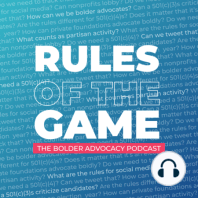25 min listen
Ballot Measures
ratings:
Length:
18 minutes
Released:
Jun 2, 2021
Format:
Podcast episode
Description
On this episode, we cover a very specific type of lobbying that doesn’t necessarily seem like lobbying in the first place. Ballot measures can range from local bonds to state constitutional amendments, and everything in between. What can nonprofits do to support or oppose them, and how do they comply with state and federal law? Our attorneys for this episode Tim Mooney Natalie Ossenfort Quyen Tu What are Ballot Measures? Called different things in different states and localities Bond Constitutional Amendments Referenda Ballot questions / initiatives Propositions Any policy matter put to a vote of the general public There are no federal ballot measures, but federal law has one major thing to say about measures for 501(c)(3)s State and sometimes local laws cover campaign finance and reporting requirements Can nonprofits take a stance? No. End of episode. (just kidding!) Most can. All 501(c)s that aren’t charities or foundations can (generally) do an unlimited amount of ballot measure advocacy, but must follow state and local laws for reporting their work Public charities can take a stance, but ballot measures are lobbying (which is why this episode is in the lobbying series!). From there, they also have to follow state and local laws for reporting their work Private foundations cannot take a stance on ballot measures (again...lobbying) without being hit with a big excise tax Wait, lobbying? Tell me more. Boil it down? Voters are a giant legislative body Direct lobbying, not grassroots – and that’s good because charities can do more direct lobbying Doesn’t violate the prohibition on electioneering to support or oppose measures because they are not related to candidates Be careful to make sure your org’s advocacy isn’t seen as/tied to a candidate’s position on the ballot measures Clock starts ticking when petitions go out to qualify for the ballot or (probably) when you’re lobbying legislative bodies when they are determining whether to refer an item to the voters Count all prep work, staff time, communications costs, etc. You non-c3s? Tax law doesn’t restrict lobbying, and this counts toward primary purpose activity... so load up on your GOTV and voter reg work on ballot measures and (strategy time!) it can offset candidate work you do. State laws... Every state is different, starting with the fact some states don’t have ballot measures at all. Even states without statewide ballot measures like NY have local bond measures though. Any state or locality with ballot measures has some kind of registration and reporting laws We have state law resources for your state! Examples: Texas Corporations (including nonprofits) can support or oppose ballot measures in Texas. Texas Election Code defines a political committee as two or more persons acting in concert with a principal purpose of accepting political contributions or making political expenditures. Since the definition of “persons” includes nonprofit corporations and expenditures and contributions include those made in connection with a measure, it is possible for nonprofits to trigger PAC registration and reporting in Texas even if they don’t do any candidate-related work. TRANSLATION: if a group of nonprofits comes together to raise funds for the support or opposition of a measure, they may need to register and report as a PAC. It is also possible that if a nonprofit acts on its own to impact a ballot measure, it could trigger direct campaign expenditure (aka independent expenditure) reporting even if it doesn’t coordinate its work with other organizations or individuals. DCE reporting, as it’s sometimes referred to, kicks in when more than $100 is spent to support or oppose a measure. Of course, there are other scenarios as well that might not require state-level reporting in the ballot measure context in Texas (e
Released:
Jun 2, 2021
Format:
Podcast episode
Titles in the series (98)
Federal Lobbying Disclosure: On this episode, we have issued ourselves a challenge... to make a relatively dry topic interesting for our listeners... What is that topic, you ask? The Federal Lobbying Disclosure Act (LDA)! We’ll talk about what it is, why you may NOT need to... by Rules of the Game: The Bolder Advocacy Podcast
